|
|
|
Sort Order |
|
|
|
Items / Page
|
|
|
|
|
|
|
| Srl | Item |
| 1 |
ID:
119438
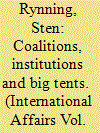

|
|
|
|
|
| Publication |
2013.
|
| Summary/Abstract |
Armed interventions of the past decades demonstrate that strategic leadership can give way to lofty campaign plans, conflicting strategic narratives and concern with tactical, as opposed to strategic, issues. The intervention debate rightfully emphasizes the need for both leadership and institution-building to rectify this situation, but then breaks down into discord: some critics argue that stronger leadership by big nations is necessary, others that this type of leadership wrecks the collective institutions that are needed in a new age of multilateralism and interdependence.
This article argues instead that strategic leadership grows out of the effort to connect the three distinct political arenas that have come to dominate armed interventions: coalitions, institutions and big tent diplomacy. Strategic leadership is not about choosing between coalitions or institutions; it is about building bridges among these political arenas.
The article embeds this argument within the strategic literature and demonstrates how it emerges from an engagement with modern armed interventions. It engages in two in-depth assessments of NATO's experiences in Afghanistan and Libya and then undertakes a more general discussion of the steps that can be taken to encourage strategic leadership.
|
|
|
|
|
|
|
|
|
|
|
|
|
|
|
|
| 2 |
ID:
119436
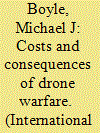

|
|
|
|
|
| Publication |
2013.
|
| Summary/Abstract |
One of the distinctive elements of President Barack Obama's approach to counterterrorism has been his embrace of Unmanned Aerial Vehicles (UAVs), or drones, to target terrorist operatives abroad. The Obama administration has used drones in active theatres of war, such as Afghanistan, but it has also dramatically increased the number of drone attacks launched by the CIA in other countries, such as Pakistan, Yemen and Somalia. The conventional wisdom on drone warfare holds that these weapons are highly effective in killing terrorist operatives and disabling terrorist organizations, while killing fewer civilians than other means of attack.
This article argues that much of the existing debate on drones operates with an attenuated notion of effectiveness that discounts the political and strategic dynamics - such as the corrosion of the perceptions of competence and legitimacy of governments where drone strikes take place, growing anti-Americanism and fresh recruitment of militant networks - that reveal the costs of drone warfare. Focusing particularly on drone use in Pakistan, Yemen and Somalia, the article suggests that the Obama administration's counterterrorism policy operates at cross-purposes because it provides a steady flow of arms and financial resources to build up governments whose legitimacy it systematically undermines by conducting unilateral strikes on their territory.
It concludes that the US embrace of drone technology is a losing proposition over the long term as it will usher in a new arms race and lay the foundations for an international system that is increasingly violent, destabilized and polarized between those who have drones and those who are victims of them.
|
|
|
|
|
|
|
|
|
|
|
|
|
|
|
|
| 3 |
ID:
119440
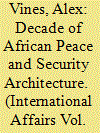

|
|
|
|
|
| Publication |
2013.
|
| Summary/Abstract |
This article examines how the African Union (AU) has handled Africa's peace and security challenges since 2002, defines what has been successful and what remains aspirational. It does so by examining how the AU has responded, from using sanctions against coups, to deploying peacekeeping missions and mediating in conflicts.
An African Peace and Security Architecture (APSA) has developed since 2002, including a Peace and Security Council, an African Standby Force, a Continental Early Warning System and a Panel of the Wise. This sounds impressive, but the operationalization record is patchy: AU-deployed missions have been fully dependent on external donors; harmonization is a major problem; serious questions remain over AU capacity; and some of the Regional Economic Communities (RECs) are developing at a quicker pace than the AU.
Given these circumstances and its internal capacity deficit, the AU will likely struggle to exercise oversight of regional processes, including the development of regional standby force arrangements. APSA is clearly based on a liberal peace model, yet democratic systems, respect for human rights and good governance aren't always in place in African countries, and the self-interest of elites continues to be a constraint on APSA and its success.
Over the last decade the AU has found a voice and, despite some setbacks, it has shown through AMISOM in Somalia that it is capable of conducting a successful peacemaking operation. Its biggest challenge is not making the decision to intervene or deploy forces, but the capacity of most African states to deploy effectively. APSA's dependence on external partners needs to diminish over the next decade if better African solutions are to be found to peace and security challenges in the continent. Yet, the internationalized nature of crises such as the one in Mali in 2012-13 requires international partnerships.
Not all of Africa's security problems can be solved by Africa alone, but APSA does provide a vision framework for African and external partnership.
|
|
|
|
|
|
|
|
|
|
|
|
|
|
|
|
| 4 |
ID:
119437
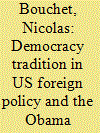

|
|
|
|
|
| Publication |
2013.
|
| Summary/Abstract |
This article proposes a three-level analysis of the democracy tradition in American foreign policy that identifies its ideational, strategic and policy dimensions and situates Barack Obama's presidency to date within it at each level. At the heart of this approach is the understanding that the motivations and practice of the United States' democracy promotion are shaped by its ideas about national identity, political order, national interest and international relations.
This is the ideational source of the democracy tradition, which, as US power has grown, has led increasingly to decision-makers setting strategic goals that include democratization abroad as a facilitator of other US goals. Only slowly has this led to the development of specific policies to that end, though, and democracy promotion as a discrete policy field mostly developed from the 1980s onwards. Democracy promotion went through a 'boom' after the end of the Cold War as the United States enjoyed unparalleled power on the international stage.
It is clear that Barack Obama and his administration belong firmly in the democracy tradition at the ideational, strategic and policy level, and they have given no cause to expect any major change in his second term as far as democracy promotion is concerned. It is in any case a mistake to think that changes in the democracy tradition come from particular leaders; rather, it is the changing international environment confronting US foreign policy that is more likely, in the longer term, to lead to a shift away from democracy promotion.
|
|
|
|
|
|
|
|
|
|
|
|
|
|
|
|
| 5 |
ID:
119442
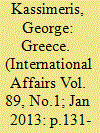

|
|
|
|
|
| Publication |
2013.
|
| Summary/Abstract |
Greece has one of the most sustained problems of political terrorism anywhere in the world. From the mid-1970s to the present, the country's political and socio-economic institutions have been confronted by systematic terrorist violence mainly at the hands of revolutionary guerrilla groups.
The long story of Greek terrorism was thought to have ended in the summer of 2002 with the collapse of the country's premier terrorist group and one of Europe's longest-running gangs, the notorious Revolutionary Organization 17 November (17N). 17N's dismantling and imprisonment, rather than demoralizing and emasculating the country's armed struggle movement, led instead to the emergence of new urban guerrilla groups and an increase and intensification of revolutionary violence.
In consequence, the article places Greek extremist violence in a broader political and cultural perspective and explains why it has become a permanent fixture of national public life.
|
|
|
|
|
|
|
|
|
|
|
|
|
|
|
|
| 6 |
ID:
119439
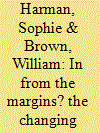

|
|
|
|
|
| Publication |
2013.
|
| Summary/Abstract |
This article surveys recent literature on Africa and International Relations (IR) and reviews the current place of Africa within the discipline. It notes that critical debates continue around claims of a mismatch between Africa and 'mainstream' IR theories and concepts.
However, alongside this set of issues, there is in fact a burgeoning literature on many aspects of Africa's international relations. While some of these studies utilize existing IR theories, and others explore empirical cases that could deliver important lessons for the wider discipline, much of this promise goes unfulfilled.
The article reviews literature on China's role and on HIV/AIDS governance in Africa to illustrate how the study of African international relations, the wider IR discipline and international policy could all benefit from a closer engagement between Africa and IR. The article concludes by setting out three challenges for a renewed agenda: a need to address the problematic relationship between universal analytical concepts and regional particularities; a need to give recognition to, and analyse, African agency in international politics; and a need to address inequalities in knowledge production in the field of Africa's international relations.
|
|
|
|
|
|
|
|
|
|
|
|
|
|
|
|
| 7 |
ID:
119441
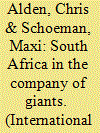

|
|
|
|
|
| Publication |
2013.
|
| Summary/Abstract |
South Africa, the continental economic giant and self-appointed spokesman for African development, is finding its distinctive national voice.
Emboldened by the invitation to join the BRICS grouping, its membership of the G20 and a second term on the UN Security Council, Pretoria is beginning to capitalize on the decade of continental and global activism undertaken by Thabo Mbeki to assume a position of leadership. Gone is the defensive posturing which characterized much of the ANC's post-apartheid foreign policy, replaced by an unashamed claim to African leadership.
The result is that South Africa is exercising a stronger hand in continental affairs, ranging from a significant contribution to state-building in the Democratic Republic of the Congo and South Sudan, to an unprecedented assertiveness on Zimbabwe.
But this new assertiveness remains constrained by three factors: the unresolved issue of identity, a host of domestic constraints linked to material capabilities and internal politics, and the divisive continental reaction to South African leadership. These factors continue to inhibit the country's ability to translate its international ambitions and global recognition into a concrete set of foreign policy achievements.
|
|
|
|
|
|
|
|
|
|
|
|
|
|
|
|
| 8 |
ID:
119443
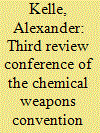

|
|
|
|
|
| Publication |
2013.
|
| Summary/Abstract |
States parties to the Chemical Weapons Convention (CWC) will convene for the Third Review Conference of the treaty in April 2013.
With the destruction of chemical weapon stockpiles more than 75 per cent complete and ongoing changes in the scientific, industrial and security environment in which the CWC operates, some have argued that major adaptations in the implementation of the treaty are required. However, on the basis of regular participant observation at CWC meetings of states parties and extensive document analysis this article argues that changes in treaty implementation will be only of an incremental nature with the Organization for the Prohibition of Chemical Weapons (OPCW) taking on new tasks in the areas of chemical terrorism and safety and security, alongside traditional core areas of activity in CWC implementation such as verification of chemical weapon disarmament, non-proliferation or, rather, non-acquisition of chemical weapons, protection and assistance against the threat or use of chemical weapons, and international cooperation in the peaceful uses of chemistry.
Taking into account the evolution of these areas of concern in combination with the consensus-based institutional culture of the OPCW supports the expectation of only incremental changes being adopted at the Third CWC Review Conference. These expectations tie in with the findings of organizational analyses in other political contexts, which highlight the path dependency of many institutions once they are created.
|
|
|
|
|
|
|
|
|
|
|
|
|
|
|
|
|
|
|
|
|